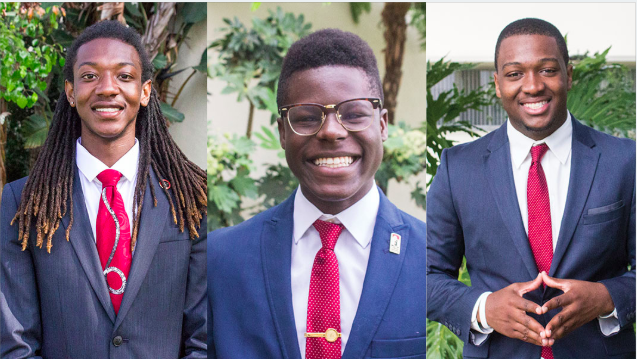Vice President of Financial Affairs Christian Onwuka brings his 13-year-old brother to class and his A.S. office weekly to show him anything is possible in the face of adversity. Onwuka is one of three people of color on the A.S. executive board focusing on empowering minority students while fostering an inclusive campus.
“I want to show other kids from similar backgrounds and neighborhoods like myself you can do this shit,” Onwuka said. “It’s not out of the ordinary for a person of color to get into a position of power and affect change.”
Onwuka is joined by Vice President of University Affairs Ronnie J. Cravens Jr. and Vice President of External Relations Michael Wiafe. Since their inauguration, the three executives have prioritized breaking down barriers.
Cravens said he ran for his position to “pay it forward” and to inspire future students of color to run. He also said his background is particularly helpful in fostering an environment of inclusivity as a student leader.
“We ran for this position to empower future leaders of minority backgrounds,” Cravens said. “Because we are the only minorities that are A.S. executives, a lot of our responsibility comes not only from representing our community but also having other voices at the table.”
Diversity of experience is also embodied within each student leader.
Wiafe said while they are persons of color, all three executives bring their differences and unique perspectives to the table. In addition to being a person of color, Wiafe is also an immigrant.
He said his immigrant background helps him relate to other students within underrepresented communities, such as undocumented students.
“My black and immigrant background helped me as a leader in recognizing these differences,” he said.
All three executives also spoke to the struggles they face as leaders, specifically in overcoming assumptions and bias outside their community while communicating the importance of advocacy for all students.
Wiafe said leadership is about making tough decisions while also making the right ones.
“Even though I’m a black executive, it doesn’t mean everything I do is for the black students on this campus,” Wiafe said. “I’m working for everybody because my role covers the entire student body.”
Onwuka also said being a black A.S. executive is the “hardest thing” due to anti-black bias.
“You may not like me because I’m black, but you will respect me and the work I do,” he said.
Despite the struggles, the three executives championed their accomplishments as student leaders, specifically in breaking down barriers for persons of color to run for leadership positions on campus. They cited the need for additional faculty and administrators with diverse backgrounds to increase inclusivity and diversity on campus.
The three executives also shared their views on Black History Month and the role it plays on campus.
Wiafe said Black History Month is an opportunity for black students to have events and gather together. Cravens said the event does a lot of good but shouldn’t be confined to one month. Onwuka especially called for continual recognition of black achievement.
“What we should be doing as a university and society is celebrating when people do great things,” Onwuka said. “We shouldn’t limit the contribution of people of color to this society to just one month.”
Onwuka also said organizations conducting outreach seeking to expand membership diversity should continuously recruit to all underrepresented communities outside of cultural heritage months.
“I get mad when I hear people place emphasis on a marginalized group only for one month,” Onwuka said. “Why aren’t you doing that the entire year?”








